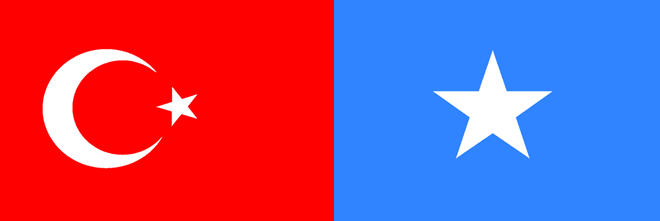Amina Adan
Wednesday, March 25, 2015

President Erdogan’s visit to Mogadishu in 2011, which at the time, was the Prime Minister, was a significant step in moulding the relationship between Somalia and Turkey. Today Turkey’s unwavering humanitarian, financial and educational assistance is clearly evident in the capital. Nevertheless, many people have begun to question the hidden motives of President Erdogan. Whether it’s a political strategy or just genuine aid.
The political relation between the two nations is not new but rather a rekindle of an old flame. The bilateral relations between the two date back to the conflict of Abyssinian and Adal in the 1500’s, where the Ottoman Empire and Adal Sultanate were allies during the war. After the collapse of the government regime in 1991, many countries, including Turkey terminated their operations in the country. Later re-establishing their relations with the nation’s newly inaugurated Transitional National Government in the early part of the new decade.
Turkey formally resumed diplomatic relations with Somalia in 2011, following the visit of Prime Minister Erdogan, who placed great emphasis on cementing brotherhood between Somalia and Turkey. The two nations alongside being allies during the 1500’s, were also founding members of the Organisation of Islamic Cooperation in 1969. Erdogan’s visit in 2011 bought many things to the nation and its residents, he pledged that Turkey would build multiple hospitals and reconstruct the airport road leading into the capital. Four years later, it is apparent that Erdogan is a man of his word.
The development of the hospitals, schools and the new airport terminal which opened in 2015 provides evidence that Turkey have replenished feasible and tangible assets in Mogadishu. Since 1991, the UN has spent over $110 billion in Somalia in contrast to the $550 million, which Turkey has invested since 2011. This has provided economical and sustainable assets for the nation, with reference to Turkey’s commitment in improving the level of literacy they have provided scholarships for Somali youths to study in Turkey, vocational courses for sectors such as construction and fisheries, and also the development of infrastructure that provides trade and monies for the remittances-dependent economy. This can be seen as a clear example of the value of working internally and on the ground, in contrast to working from a local café 632 miles south of the city, in Nairobi.
As one of the first nations to reopen their embassy in Mogadishu, Turkey went the extra mile to show their commitment and legitimate relations with the government by opening their embassy in downtown Mogadishu, a stark contrast to other nations who have their embassy’s inside the capital’s airport.
Nevertheless, many people, including regional politicians have criticised Turkey’s presence in Somalia, rather suggesting that they only have a presence in the capital, Mogadishu. This is evident through the prioritised development in the capital, through schools, mosques, hospitals and roads. Turkey’s ambassador to Somalia, explained that Turkey’s humanitarian aid to Somalia is restricted due to the heavy pressure of Islamist groups further in the South. This has made regional politicians, especially from Puntland and Somaliland, question why Turkey’s aid and relations is stronger in the capital, despite the evident fact that there is barely none, if not any, terror threats or terror presence further up north.
Aside from the humanitarian aspect of Turkey’s presence in Somalia, they have tried highlighted the importance of not meddling in the local politics of Somalia, despite the fact that they have held multiple reconciliation attempts between the Federal Government of Somalia and the self-declared-autonomous region of Somaliland. Their main concern is the dire need for a stable and effective government.
In March 2012, Turkish Airlines officially announced that it was to resume flights to Somalia seven days a week, which set a path for other national carriers to do the same. Nevertheless, this announcement has had significant pressure on Somali-owned airlines such as Daallo Airlines to improve customer services, who’ve been flying in and out of the nation since 1991 and taking up the role of the national carrier Somali Airlines who had terminated operations that same year. Since 2013, many other carriers have included Mogadishu, and other cities in the country as destinations, including African Express Airways, Felix Airways and the new addition Qatar Airways that will begin operations to Somalia. This has showed regrowth in the nation’s aviation plans. All that is left is the re-establishment of the extremely anticipated Somali Airlines, in which, preparations have been under way since 2012.
Turkey’s diplomatic presence in Somalia has clearly improved the lives of many local residents of Mogadishu, through the humanitarian aid provided during and consistently after the famine outbreak in 2011. Also, the development assistance through state institutions, infrastructure and education; in which, the residents and the nation of Somalia are clearly appreciative of. On the other hand, Turkey’s alternative interests, if any, will only become as clear as day further down the rebuilding stage of Somalia’s nation.
Amina Adan.
Twitter: @aia_24